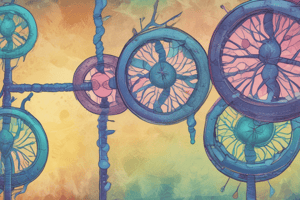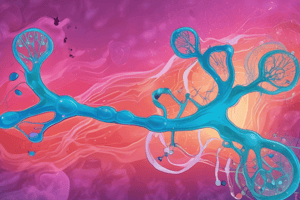Podcast
Questions and Answers
What is the consequence of losing control of cell division in an individual cell due to mutations?
What is the consequence of losing control of cell division in an individual cell due to mutations?
The result is a group of cells that increase in number exponentially without normal controls, leading to tumour formation.
What are the two main classes of mutagens that increase the chance of tumour formation?
What are the two main classes of mutagens that increase the chance of tumour formation?
Mutagenic chemicals and high-energy radiation, such as X-rays and ultraviolet radiation.
What is the role of proto-oncogenes in a normal cell, and what happens when they mutate?
What is the role of proto-oncogenes in a normal cell, and what happens when they mutate?
Proto-oncogenes regulate cell proliferation, secondary messenger systems, and growth factors. When they mutate, they become oncogenes, which actively promote cell proliferation and are genetically dominant.
What type of mutation can change a proto-oncogene into an oncogene?
What type of mutation can change a proto-oncogene into an oncogene?
Why is only one mutated proto-oncogene needed to increase the chance of tumour formation?
Why is only one mutated proto-oncogene needed to increase the chance of tumour formation?
What is the significance of the International Agency for Research on Cancer's list of substances that are 'definitely carcinogenic'?
What is the significance of the International Agency for Research on Cancer's list of substances that are 'definitely carcinogenic'?
Flashcards are hidden until you start studying
Study Notes
Control of Cell Cycle and Tumour Formation
- Cell cycle control ensures that tissues have the right number of cells, neither too many nor too few.
- Loss of control in a cell due to gene mutations can lead to uncontrolled cell division, resulting in exponential growth and tumour formation.
Mutagens and Tumour Formation
- Mutagens increase the chance of tumour formation, and there are two main classes:
- Mutagenic chemicals: over 50 substances or groups of substances are "definitely carcinogenic" according to the International Agency for Research on Cancer.
- High-energy radiation: X-rays, ultraviolet, but not visible light or other forms of low-energy radiation.
Proto-oncogenes and Oncogenes
- Proto-oncogenes have various roles in the cell, including regulating gene expression, cell proliferation, and secondary messenger systems.
- Proto-oncogenes can mutate into oncogenes, which actively promote cell proliferation and are genetically dominant.
- Only one of a pair of proto-oncogenes in a diploid cell needs to mutate to form an oncogene, increasing the chance of tumour formation.
Mutation and Gene Expression
- A mis-sense mutation can change one of the amino acids in the polypeptide coded for by the gene, making it super-active.
- This can lead to the formation of an oncogene, promoting uncontrolled cell proliferation.
Studying That Suits You
Use AI to generate personalized quizzes and flashcards to suit your learning preferences.




